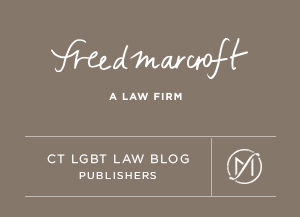But What Happened to Our Connecticut Civil Union?
 One of the questions clients ask Freed Marcroft’s lawyers is what happened to their Connecticut civil union once Connecticut same sex couples were able to marry.
One of the questions clients ask Freed Marcroft’s lawyers is what happened to their Connecticut civil union once Connecticut same sex couples were able to marry.
As you may recall, civil unions for same sex couples were a concept introduced in Vermont in 2000. In April 2005, Connecticut enacted a civil union law, making it the first state in the United States to voluntarily pass a same-sex civil unions law through the legislature without any immediate court intervention. The Civil Union Law provided all of the same rights and responsibilities of marriage except for the title.
The Civil Union Law was signed while a lawsuit, Kerrigan & Mock v. Connecticut Dept. of Public Health, was still pending. Kerrigan was filed on August 25, 2004 in New Haven Superior Court on behalf of eight gay and lesbian Connecticut couples who were denied marriage licenses. The plaintiff couples, who at that time had been in committed relationships for between 10 and 30 years, many of them raising children, contended that their exclusion from marriage violated the equal protection and due process provisions of the Connecticut Constitution.
Following the passage of the Civil Union Law, attorneys for the Kerrigan plaintiff couples further argued that the Civil Union Law created a separate institution for gay and lesbian couples which also violated the Connecticut Constitution.
On June 12, 2006, the trial court ruled for the state, claiming that there was no difference between a marriage and a civil union. The Kerrigan plaintiffs appealed this decision to the Connecticut Supreme Court. Freed Marcroft’s Meghan Freed filed a brief for the Human Rights Campaign et al as amici curiae.
The Supreme Court ruling came on October 10, 2008 in a 4-3 decision issued on the basis of equal protection and a determination that sexual orientation-based classifications receive intermediate scrutiny. In its decision, the Supreme Court ruled:
Interpreting our state constitutional provisions in accordance with firmly established equal protection principles leads inevitably to the conclusion that gay persons are entitled to marry the otherwise qualified same sex partner of their choice. To decide otherwise would require us to apply one set of constitutional principles to gay persons and another to all others. The guarantee of equal protection under the law, and our obligation to uphold that command, forbids us from doing so.
The state, according to the Supreme Court, had no sufficient justification for denying marriage to same-sex couples.
Okay, but then what happened to the couples that entered into civil unions between the 2005 passage of the Civil Union Law and the 2008 Kerrigan decision ruling civil unions unconstitutional?
On April 23, 2009, the Governor signed into law Public Act 09-13, “An Act Implementing the Guarantee of Equal Protection Under the Constitution of the State for Same Sex Couples,” which provided a process for moving from a system in which both civil unions and marriage are available to gay and lesbian couples to a system in which only marriage is available.
Therefore, all existing Connecticut civil unions were converted into marriages on October 1, 2010.
Even though Connecticut civil unions are now marriages, same sex couples should consider speaking with an attorney. Life and estate planning is important for everyone, but it is even more important for people in same sex relationships — even when they are legally married.
Meghan Freed and Kristen Marcroft publish the Connecticut LGBT Law Project as a resource of legal news and commentary for the Connecticut lesbian, gay, bisexual and transgender community and their friends, families, and allies.
At their law firm, Freed Marcroft LLC, Kristen and Meghan practice estate planning, family, real estate, litigation, business and non-profit planning, and immigration law in the historic Linden building on Main Street in Hartford, Connecticut. The attorneys’ practice is welcoming to all Connecticut individuals, families, and small businesses, especially including same sex couples and members of the lesbian, gay, bisexual, and transgender communities.

